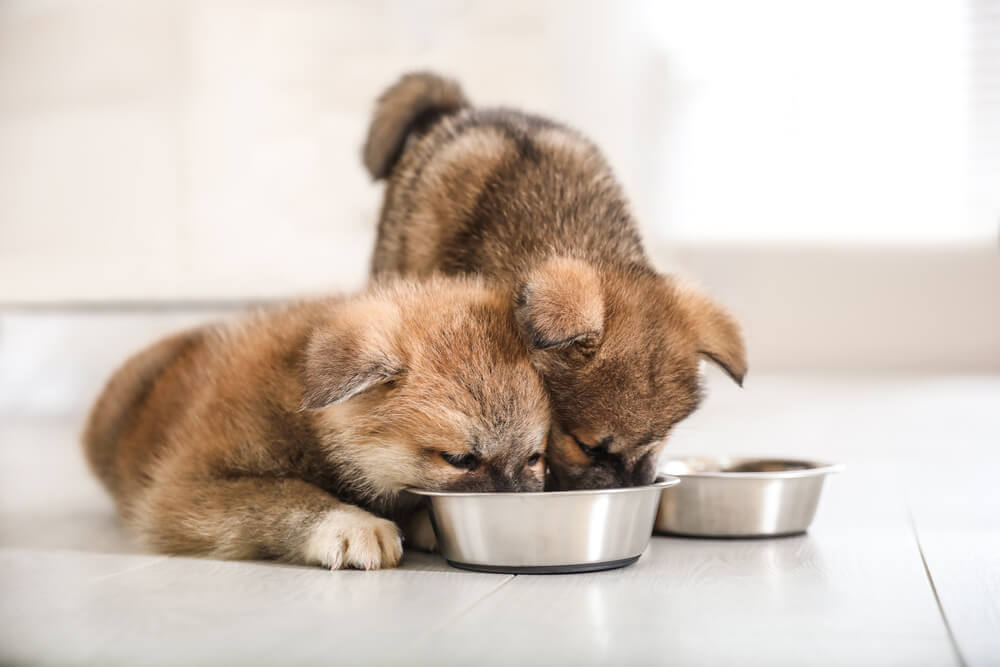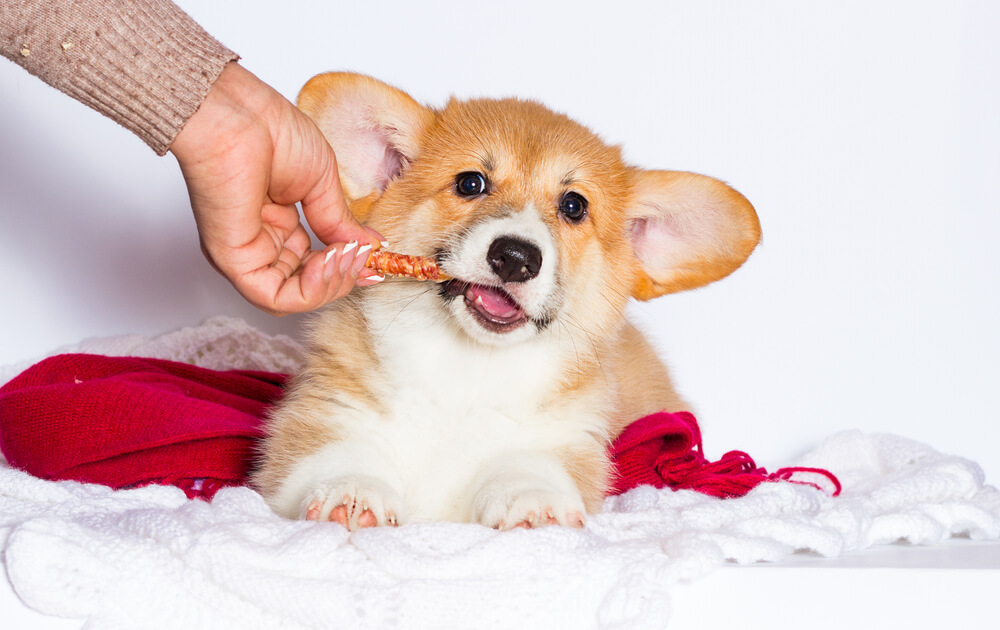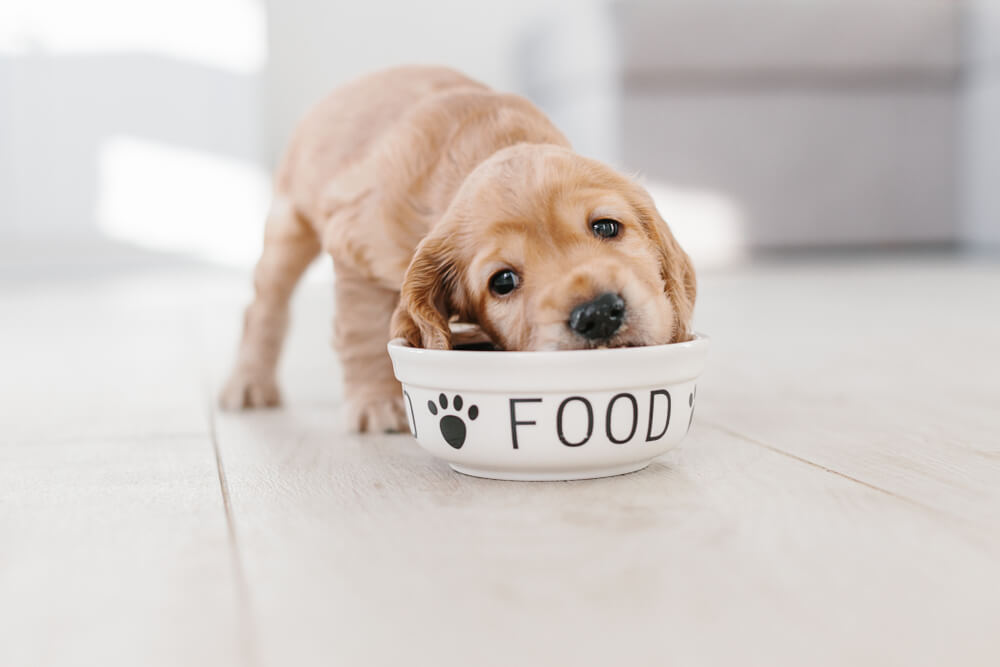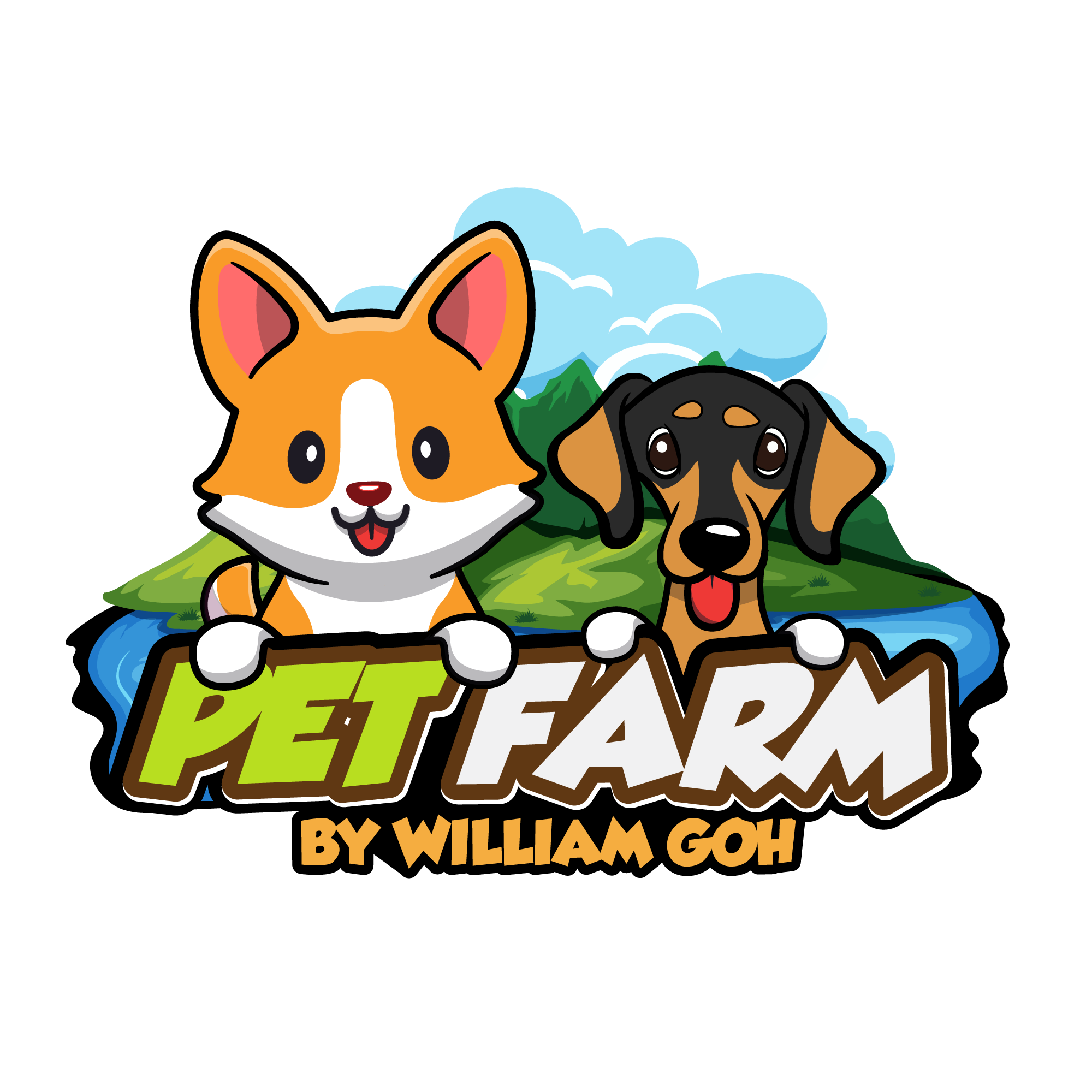How Much To Feed A Puppy?

Table of Contents
Listen To The Article
Introduction to How Much To Feed A Puppy
When it comes to raising puppies, there is a lot to think about.
To avoid future health problems, like joint problems, you should feed your puppy food made with the right nutrients.
We must know how much to feed a puppy, most puppy foods are made with the nutrients that puppies need to grow into healthy adults.
If you are feeding your puppy some other brand of food, just know that there are risks to not feeding your puppy food.
The number one cause of preventable health issues in puppies is feeding them puppy food that is not designed for their age range.
Puppy food is designed to mimic the mother’s milk as closely as possible and has a higher protein and fat content than dog food.
It is also easy to digest and contains all the vitamins and nutrients the baby puppy needs.
Because of this, feeding a puppy dog food will result in them not getting the nutrients they need to grow up and can trigger allergies and even life-threatening diseases that are not curable once they appear.
There’s a lot to plan for a puppy’s arrival. At the top of the list is how much to feed a puppy.
Your puppy’s portions depend on his breed, weight, and age.
Plan ahead and create a puppy feeding schedule that is consistent, nutritionally balanced, and meets his energy requirements.

Feeding Puppy On Its First-Year Timeline
Getting a new puppy is exciting, but it is no simple task either, especially if you are a first-time owner there is a lot to know before bringing your new puppy home to ensure you are suitably prepared and that he or she will be comfortable some of the biggest conundrums are to do with the best puppy food for your dog, and how to properly feed puppies, after all, you can’t trust your puppy to tell you; they are likely to eat whatever is put under their nose and perhaps you already own a puppy or have had one in the past, but want to see if you can learn something new?
6-12 weeks:
Growing puppies should be fed puppy food, a diet specially formulated to meet the nutritional needs for normal development. Feeding adult food will rob your puppy of important nutrients, four feedings a day are usually adequate to meet nutritional demands and large breeds should be fed unmoistened dry food by 9 or 10 weeks; small dogs by 12 or 13 weeks.
3-6 months:
Sometime during this period, decrease feedings from four to three a day, and a puppy should be losing her potbelly and pudginess by 12 weeks if she is still roly-poly at this age, continue to feed puppy-size portions until body type matures.
6-12 months:
Begin feeding twice daily. Spaying or neutering lowers energy requirements slightly; after the procedure, switch from nutrient-rich puppy food to adult maintenance food. Small breeds can make the switch at 7 to 9 months; bigger breeds at 12, 13, even 14 months. Err on the side of caution: Better to be on puppy food a little too long than not long enough.
After age 1:
Most owners feed adult dogs two half-portions a day.
Puppies start out needing many small meals a day, of food formulated for their special nutritional requirements, most, but not all, dogs finish meals quickly and to discourage picky habits, feed at regular times in regular amounts, don’t leave food down for more than 10 to 20 minutes unlike mature dogs that eat once or twice a day, most puppies need to eat puppy food three times a day to make it easier to remember by planning his mealtimes around your own breakfast, lunch, and dinner and wash out his water bowl and make sure it’s always filled with clean water, too.

All About Puppy Food
Is it worth it to buy expensive puppy food?
Premium food has a higher nutritional density, so you can feed your dog less to achieve the same result, also, premium foods have stable ingredient profiles.
The composition of bargain brands can vary from batch to batch and the major dog-food companies invest heavily in product development and research, constantly upgrading formulas to keep up with their competitors and this means that feeding premium food puts you on the cutting edge of puppy’s nutrition.
Selecting puppy food can be daunting. Most major dog food companies work with pet food nutritionists and adhere to strict guidelines for creating complete and balanced nutrition.
Dry food, wet food, or both?
The most important thing to remember when choosing a dog’s diet is that it’s appropriate for your puppy’s life stage.
Dry food mainly brings advantages for the owner in terms of price, cleanliness, and convenience, the advantages of wet food benefit the dog itself.
Most dogs would probably opt for wet food if they could choose themselves, since wet food, more intense in smell and taste, simply tastes better to them.
- Canned food is the most expensive to feed, and dogs often find it most palatable. Be careful of “all-meat” claims, though. Your dog should have a complete, balanced diet to fulfill nutritional requirements. Raw dog food alone may not do it.
- Semi-moist food is available in one-serving packets. It is usually made to look like a hamburger.
- Kibble is the most economical, and the major makers offer a complete and balanced diet for dogs of all sizes and ages. Dry food can be fed exactly as it comes from the bag.
Some dog owners say there is an oral-hygiene advantage in hard kibble because the friction produced helps to keep the gums and teeth healthy.
Kibble can be moistened, either with water or canned food.
Wheat and Grain-Free Food
Wheat and grain are fine for puppies to eat and grain-free food is just as nutritious an option as other types of dog food this is because modern dogs have evolved to be able to digest grains more easily compared to their ancestors, a small percentage of humans, some dogs are intolerant to grain in their diet, so grain-free food is a healthy and delicious alternative whatever you decide to feed your puppy, unless all the food is consumed in one sitting, remember to pick it up and keep it fresh while dry food can be left out for up to a day, wet or moistened food can go moldy and should be removed after no longer than half an hour and you need to ensure your puppy constantly has freshwater anyway, so we recommend always feeding your puppy fresh food too.
What can a puppy eat?
Most pet food should be formulated to be a complete diet, meeting all the nutritional and calorific needs of your pet.
Puppy food is no different and so you should keep your new family member on a diet of their food only.
We understand that training your puppy is an important part of helping them to become a model citizen and increasing your bond together traditional dog treats are a great way of encouraging your puppy to learn, but these should be given sparingly in order not to disrupt their balanced diet always make sure you are using treats that are suitable for puppies, portioning off some of your puppy’s daily diet to use as treats is one way of ensuring they don’t over-eat.
Traditional dog treats should not make up more than their daily calorie intake and you can use healthy alternatives to treat your dog. While some fruits and vegetables are unsafe for dogs to eat, many can be consumed safely and make great substitutes for traditional treats, effective training snacks, and don’t upset your puppy’s diet to the same extent be advised that while some fruit and veg are healthy alternatives.
They can be quite hard on young teeth and could even be choking hazards for puppies, so should be given with caution although these treats are healthy alternatives, they should still make up no more than 10% of your puppy’s daily intake, due to the sugar content.
Foods puppies should avoid
Unfortunately, while some human foods can be consumed safely by puppies in small quantities, there is an exhaustive list of toxic and even life-threatening foods which should be avoided at all costs.
Here are just some of the more common ones: Almonds, Chocolate, Cinnamon, Garlic, Ice cream, Macadamia nuts, Avocados, Raisins and grapes, Alcohol, Onion, and Heavily salted or sweetened food it is best to only give your dog food that has been specifically manufactured for dogs to avoid any potentially harmful foods and be careful of leaving toxic food and drink where your puppy can reach it.
You can find more information on what dogs can and can’t eat here.
Don’t overfeed the puppies
Dogs, in general, seem to have voracious appetites, and puppies may be too young to figure out when their little tummies are full they may continue eating, or snacking, even when they aren’t hungry eating too much can lead to food bloat or even a life-threatening condition called gastric dilation-volvulus GDV essentially means your puppy has eaten himself sick and is in danger of suffering from a twisted stomach his little belly may look extremely distended, he may retch unsuccessfully and salivate excessively and call your veterinarian if you notice these symptoms for immediate treatment your puppy’s life could depend on it.

Puppy Feeding Advice
Puppy is begging for food
The pleading gaze of a begging dog can be irresistible, this is no accident, during his long partnership with man, the dog has perfected cunning methods of exploiting the human habit of associating food with affection dogs have since refined this approach into a low-risk, high-reward hunting technique but don’t be fooled: Begging is not an emotional crisis or a test of your love it’s what scientists might call an evolutionary survival strategy, or what the rest of us might call a scam allowing your dog to guilt you into overfeeding him or serving him a steady dog’s diet of table scraps in a misguided show of affection, can have harmful or even fatal results and create a puppy feeding chart for your feeding schedule for your growing puppy.
Puppy isn’t eating the food
While most puppies will rapidly scoff down whatever food you give them, some can be very fussy eaters not eating regularly, or at all, can be the symptom of a larger health problem, so you should see your vet and rectify this before turning to the food and your puppy’s eating habits, failing to eat due to illness is normally accompanied by lethargy and a change in behavior, but not always, you may be able to check for bad teeth, growths, sores, or foreign objects in the mouth or throat, but your vet has the tools and know-how to find and diagnose these things faster, as well as take the necessary actions or prescribe the essential medication to help your puppy recover.
Furthermore, if your dog is not showing any external symptoms, but is still refusing to eat, vomiting up their food, or suffering from prolonged diarrhea, then it could be something internal, don’t try to solve the problem yourself; go to your vet to give your puppy the best chance of a speedy recovery, assuming your vet has given your puppy a clean bill of health, the next thing to examine is the atmosphere in your home, especially the area where your puppy eats, try to keep this a quiet space and relatively free of too much foot traffic while most dogs don’t mind other people being near them while they eat.
If your puppy isn’t eating, this could be the reason as with their energy levels, a puppy’s metabolism can also go up and down, which leads to them not wanting to eat, if your dog doesn’t seem hungry, try putting the food down for twenty minutes and removing it after this time, regardless of whether it has been eaten or not, then do not give your puppy any other food or treats until their next mealtime.
If this doesn’t work, it may be that you need to try a different animal protein or a different type of food we would advise switching food slowly by gradually introducing the new food and phasing out the old, and if your puppy continues to refuse food, you may need to seek expert advice, do not make any changes to your puppy’s diet without consulting a veterinarian first.
Balance healthy diet with exercise and play
The best guide to how well your puppy is doing, both physically and mentally, is how interactive, sociable and happy they seem puppies want to play, they want to love and affection. T
They want to eat and sleep so long as they are doing these things, you are doing a good job while it is up to you which puppy food you buy for your new family member.
Avoid the traps of home remedies or food meant for human consumption, just as you should avoid giving your puppy adult dog food.
Puppies need to get the right amount of nutrients to ensure they have the energy to grow strong, and the best way to achieve this is to feed your dog puppy food that has been designed with their breed and health in mind.
Once you’ve established which food your puppy enjoys, a meal plan throughout the day, and a healthy exercise routine, your puppy will soon settle into the habits you set for them, including when to expect mealtimes.
From then on, just keep an eye on their eating habits and behavior and let your vet know if anything changes. Otherwise, focus on enjoying your time with your puppy; training them, playing with them, and maybe slipping them the occasional puppy treat as a reward.



